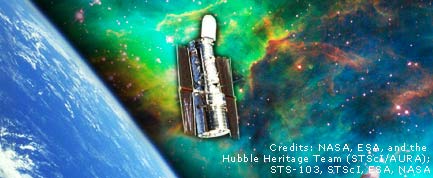Is Hubble Worth the Upgrade Mission's Risk and Cost?

Get the world’s most fascinating discoveries delivered straight to your inbox.
You are now subscribed
Your newsletter sign-up was successful
Want to add more newsletters?

Delivered Daily
Daily Newsletter
Sign up for the latest discoveries, groundbreaking research and fascinating breakthroughs that impact you and the wider world direct to your inbox.

Once a week
Life's Little Mysteries
Feed your curiosity with an exclusive mystery every week, solved with science and delivered direct to your inbox before it's seen anywhere else.

Once a week
How It Works
Sign up to our free science & technology newsletter for your weekly fix of fascinating articles, quick quizzes, amazing images, and more

Delivered daily
Space.com Newsletter
Breaking space news, the latest updates on rocket launches, skywatching events and more!

Once a month
Watch This Space
Sign up to our monthly entertainment newsletter to keep up with all our coverage of the latest sci-fi and space movies, tv shows, games and books.

Once a week
Night Sky This Week
Discover this week's must-see night sky events, moon phases, and stunning astrophotos. Sign up for our skywatching newsletter and explore the universe with us!
Join the club
Get full access to premium articles, exclusive features and a growing list of member rewards.
Find full mission coverage on our sister site, SPACE.com. Vote below.
***
Years ago, you could walk into any bar and ask the crowd to name a telescope, and they'd likely respond with a Cheers-like-greeting-to-Norm, "Hubble!" Not sure why you'd want to do that, but if you want to try it today, it'll still work. No telescope has ever engaged the public imagination so effectively.
After an eye operation to fix its blurred vision in 1993, Hubble has been sending back gorgeous, scientifically priceless images that have become NASA's best publicity, the most tangible and colorful justification for a space agency that spends billions on less glamorous endeavors such as circling the Earth for decades in shuttles and the space station.
Over the years, from development to launch to repair missions, Hubble has cost around $10 billion.
If all goes well Monday at 2:01 p.m. ET, astronauts will launch aboard the space shuttle Atlantis on a risky mission loaded with spacewalks to give Hubble one last grand upgrade at a cost of about $1.1 billion.
The stakes are high. Because of Hubble's altitude, if Atlantis is irreparably damaged during flight, the crew won't be able to get to the International Space Station. A second shuttle, Endeavour, is also ready to launch in the unlikely event a rescue is needed.
Get the world’s most fascinating discoveries delivered straight to your inbox.
No mission has been as thoroughly planned, Hubble scientists say.
If it succeeds, Hubble will be more powerful than ever. Astronomers expect it to see deeper into the universe, revealing new secrets from near the beginning of time. If the mission fails, Hubble will soon be a big pile of space junk.
Did You Know?
- Hubble doesn't actually take color pictures. Color is added with Photoshop.
- When Hubble looks across the universe, it is looking back in time.
- This mission almost never got the green light.
About This Mission:
- Vote: Hubble's Best Images
- The Improved Hubble: What it Will Do
- The Hubble Rescue Mission: What Could Happen?
- Hubble FAQ: Inside the Last Space Telescope Repair Mission
- Complete Hubble Mission Lunch and Mission Coverage
- Video Show - Hubble's Final Service Call
Robert Roy Britt is the Editorial Director of Imaginova. In this column, The Water Cooler, he looks at what people are talking about in the world of science and beyond.
Robert is an independent health and science journalist and writer based in Phoenix, Arizona. He is a former editor-in-chief of Live Science with over 20 years of experience as a reporter and editor. He has worked on websites such as Space.com and Tom's Guide, and is a contributor on Medium, covering how we age and how to optimize the mind and body through time. He has a journalism degree from Humboldt State University in California.
 Live Science Plus
Live Science Plus











